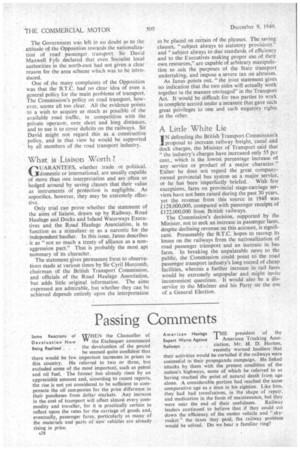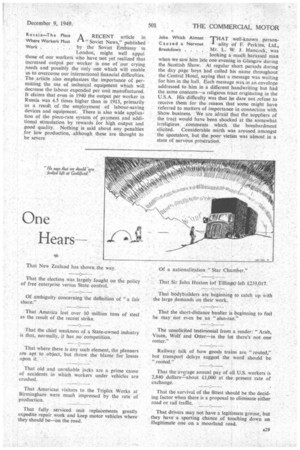Passing Comments
Page 30

Page 31

If you've noticed an error in this article please click here to report it so we can fix it.
WHEN the Chancellor of vv the Exchequer announced the devaluation of the pound he seemed quite confident that there would be few important increases in prices in this country. He referred to two or three, but excluded some of the most important, such as petrol and oil fuel. The former has already risen by an appreciable amount and, according to recent reports, the rise is not yet considered to be sufficient to compensate the oil companies for the price difference in their purchases from dollar markets. Any increase in the cost of transport will affect almost every commodity and traveller, for it is practically certain to reflect upon the rates for the carriage of goods and, eventually, passenger fares, particularly as many of the materials and parts of new vehicles are already rising in price.
A28
Some Reactions of Devaluation Now Being Realized . . .
THE president of the American Trucking Ass6ciation, Mr. H. D. Horton, recently warned hauliers that their activities would be curtailed if the railways were successful in their propaganda campaign. He linked attacks by them with the present condition of the nation's highways, some of which he referred to as having reached the point of natural death from age alone. A considerable portion had reached the same comparative age as a man in his eighties. Like him, they had had transfusions, in the shape of repair, and medication in the form of maintenance, but they
were near the end of their usefulness. Railway leaders continued to believe that if they could cut down the efficiency of the motor vehicle and !` skyrocket" the taxes they paid, the railway problem would be solved. Do we hear a familiar ring?
American Haulage Expert Warns Against Railways
ARECENT article in Soviet News," published • by the Soviet Embassy in London, might well appal those of our workers who have not yet realized that increased output per worker is one of our crying needs and possibly the only one which will enable us to overcome our international financial difficulties. The article also emphasizes the importance of permitting the use of technical equipment which will . decrease the labour expended per unit manufactured. It claims that even in 1940 the output per worker in Russia was 4.5 times higher than in 1913, primarily as a result of the employment of labour-saving devices and equipment. There is also wide application of the piece-rate system of payment and additional stimulation by rewards for high output and good quality. Nothing is said about any penalties for low production, although these are thought to he severe
Russia—The Place Where Workers Must Work Joke Which Almost THAT well-known person Caused a Nervous ality of F: Perkins, Ltd.,
Breakdown . . . Mr.. L. W. J. Hancock, was looking a much harassed man when we saw him late one evening in Glasgow during the Scottish Show. At regular short periods, during the day page boys had called his name throughout the Central Hotel, saying that a message was waiting for him in the hall.: Each message was. in an envelope addressed to him in a different handwriting but had the same contents—a religious tract originating in the U.S.A. His difficulty was that he dare not refuse to receive them for the reason that some might have referred to matters of importance in connection with Show. business. We are afraid that the suppliers of the tract would have been shocked at the somewhat irreligious comments which . the bombardment elicited. Considerable mirth was aroused amongst the spectators, but the poor victim was almost in a state of nervous prostration.




























































































